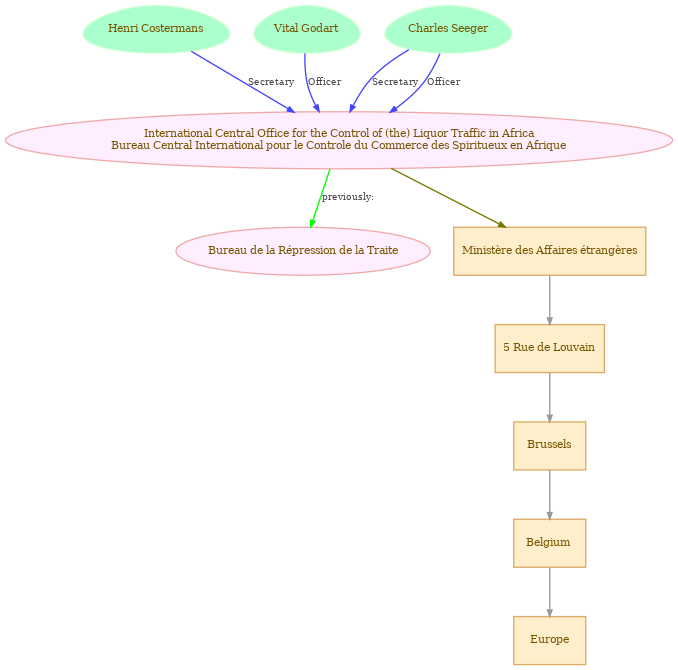




International Central Office for the Control of (the) Liquor Traffic in Africa
International Central Office for the Control of (the) Liquor Traffic in Africa, Bureau Central International pour le Controle du Commerce des Spiritueux en AfriqueFounded: 1919
Sources: HB 1923, HB 1925, HB 1929, HB 1936, HB 1938
Officers
- Henri Costermans Secretary 1923-1936
- Vital Godart Officer 1936
- Charles Seeger Secretary 1923-1936 / Officer 1936
Seats
Relationships with other Organisations
- this organisation (International Central Office for the Control of (the) Liquor Traffic in Africa) previously: Bureau de la Répression de la Traite
Members in these countries
Belgium (since 1929) , British Empire (since 1938) , British Empire (1929-1936) , Egypt (since 1925) , France (since 1923) , Italy (since 1936) , Japan (since 1923) , Portugal (since 1923) , United Kingdom (1923-1938) , United States of America (since 1936) ,Object
Réunir et conserver les documents de toute nature, échangés entre les Hautes parties contractantes relativement à l'importation et à la fabrication des spiritueux dans les conditions visées par la Convention signée à St-Germain-en-Laye, le 10 septembre 1919, sur le commerce des Spiritueux en Afrique. HB 1929: To collect and preserve documents of all kinds exchanged by the High Contracting Parties with regard to the importation and manufacture of spirituous liquors, under the conditions referred to in the Convention relating to the Liquor Traffic in Africa signed at St. Germain-en-Laye September 10th, 1919.Finances
Cotisations, dans une proportion égale, des différents pays adhérents. HB 1929: Subscription in equal proportions by the various countries adhering.General facts
Under the General Act of the Conference of Brussels, July 2nd, 1890, the task outlined above was entrusted to the Office for the Suppression of the Traffic in Alcoholic Liquors. The war put an end to the activities of this office, which was closed on August 4th, 1914. By unanimous resolution of the meeting of January 11th, 1922, the Council of the League of Nations asked the Belgian Government to continue at Brussels the work undertaken by the former office for the suppression of the traffic, and to undertake the task relating to the control of the liquor traffic in Africa. The Belgian Government accepted this task on the following February 1st. The former office was therefore reconstituted and entered on its duties immediately. In accordance with the provisions of Article 7 of the above-mentioned Convention of St.Germain-en- Laye, it transmits to the Secretariat of the League of Nations various statistical documents relating to the liquor traffic in European possessions in Africa. The Central Office was placed under the authority of the League of Nations by decision of the Council on January 11th, 1922. The Convention of St. Germain-en-Laye, September 10th, 1919, cancels, as between the signatory Powers, all other international conventions on the subject. Up to the present, it has been ratified by Belgium, Great Britain, France, Portugal, Japan and Egypt. (HB 1929) Par l'Acte général de la Conférence de Bruxelles du 2 juillet 1890, la mission définie ci-dessus avait été confiée au Bureau de la Répression de la Traite. La guerre a mis fin à l'activité de ce Bureau qui, en fait, s'est trouvé dissous le 4 août 1914. Par une résolution prise à l'unanimité dans sa séance du 11 janvier 1922, le Conseil de la Société des Nations a demandé au Gouvernement belge de continuer à Bruxelles l'œuvre entreprise par l'ancien Bureau de la Répression de la Traite, et à se charger de la tâche relative au contrôle du commerce des spiritueux en Afrique. Le Gouvernement belge a accepté cette mission le 1er février suivant. L'ancien bureau a en conséquence été reconstitué et est entré immédiatement en fonctions. Conformément aux prescriptions de l'Article 7 de la Convention de St-Germain-en-Laye susvisée, il a fait parvenir au Secrétariat général de la Société des Nations différents documents statistiques concernant le trafic des spiritueux dans les possessions européennes en Afrique. Le bureau central a été placé sous l'autorité de là Société des Nations par décision du Conseil du 11 janvier 1922, La Convention de St-Germain-en-Laye, du 10 septembre 1919, abroge entre les Puissances signataires, toutes les conventions internationales relatives au même sujet. Elle a été ratifiée jusqu'à présent par la Belgique, la Grande-Bretagne, la France, le Portugal et le Japon.Elle est donc en vigueur entre ces cinq Puissances.(six puissances HB 1925; Elle a été ratifiée jusqu'à présent par la Belgique, le Royaume-Uni, l'Egypte, les Etats-Unis d'Amérique, la France, l'Italie, le Japon et le Portugal. (HB 1936) Under the General Act of the Conference of Brussels, July 2nd, 1890, the task outlined above was entrusted to the Office for the Suppression of the Traffic in Alcoholic Liquors. The war put an end to the activities of this office, which was closed on August 4th, 1914. By unanimous resolution of the meeting of January nth, 1922, the Council of the League of Nations asked the Belgian Government to continue at Brussels the work undertaken by the former office for the suppression of the traffic, and to undertake the task relating to the control of the liquor traffic in Africa. The Belgian Government accepted this task on the following February 1st. The former office was therefore reconstituted and entered on its duties immediately. In accordance with the provisions of Article 7 of the above-mentioned Convention of St. Germain-en-Laye, it transmits to the Secretariat of the League of Nations various statistical documents relating to the liquor traffic in European possessions in Africa. The Central Office was placed under the authority of the League of Nations by decision of the Council on January nth, 1922. The Convention of St. Gennain-en-Laye, September loth, 1919, cancels, as between the signatory Powers, all other international Conventions on the subject. Up to the present, it nas been ratified by Belgium, Great Britain, France, Italy, Portugal, Japan, Egypt and the United States of America. (HB 1938)Network
